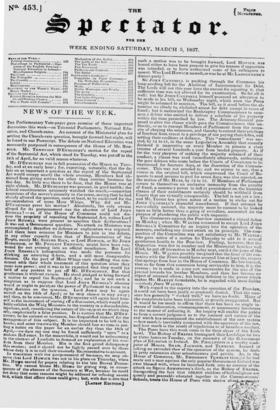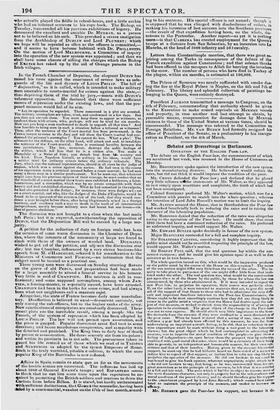NEWS OF THE WEEK.
TEE Parliamentary Vote-paper gave promise of three important discussions this week—on Triennial Parliaments, National Edu- cation, and Church-rates. An account of the Ministerial plan for settling the Church-rate question, brought forward last night, will be found in our Postscript. The debate on National Education was necessarily postponed in consequence of the illness of Mr. ROE- BUCK. Mr. TENNYSON IYEYNCOURT'S motion for the repeal of the Septennial Act, which stood for Tuesday, was put off to the 18th of April, for no valid reason whatever.
Mr. D'EYNCOURT was in full possession of the House on Tues- day, and at an early hour ; for, expecting, naturally, that the de- bate on so important a question as the repeal of the Septennial Act would occupy nearly the whole evening, Members had ab- stained from giving notices for other than routine business for that day. So little was there to be done, that the House rose at eight o'clock. Mr. D'EYNCOURT was present, in good health ; the Liberal constituencies anxiously watched the result,—somewhat suspicious of the mover's sincerity in the cause, seeing that he had already allowed the question. once at least, to be cushioned for the accommodation of some Mere Whigs. Why did not Mr. D'EYNCOURT press his motion ? Absolutely, the only excuse alleged for its postponement was the absence of Lord JOHN RUSSELL — as if the House of Commons could not dis- cuss the propriety of repealing the Septennial Act, unless Lord JOHN RUSSELL were present to sanction their deliberations ! It was not a Government question. No attack on Ministers was contemplated; therefore no defence or explanation was required. Had there been occasion for Ministers to join in the debate, in any other capacity than that of Representatives of the People, surely Mr. SPRING Rice, or Lord HOWICK, or Sir JOHN HOIDIOUSB, or Mr. POULETT THomsoN, might have been con- verted for one evening into an official mouthpiece. But Lord Joie RUSSELL'S indisposition was made the pretence for shirking an annoying debate, and a still more disagreeable division. On the part of Mere Whigs such shuffling was con- sistent with their whole treatment of this question since they came into power ; and it was to be expected that they would lay hold of any pretext to put off Mr. D'Evemona.r. But that gentleman is without excuse. He stood pledged to bring forward a motion to repeal the Septennial Act; and lie is not such a simpleton as to suppose that Lord Joitm RUSSELL'S absence would or ought to paralyze the power of Parliament to come to a right decision on the question. Lord JOHN may be again unwell on the 18th of April ; or ho may choose to stay away ; and then, to be consistent, Mr. D.Evocomer will again lend him- self as the instrument of staving cif a discussion, which would pro- bably exhibit the Whig Ministers to the country in a diecreditable„ injurious, and, considering the nature of the support on which they rely, emphatically a false position. It is certain that Mr. D'Ever • Comer, be lie earnest or insincere, has disqualified himself fur the management of this subject. It is too important to be left in his hands; and some trustworthy Member should lose no time in put- hug a notice on the paper fur an earlier day than the 18th of April,—we dare say one may be found sufficiently " open " to a zealous Reformer. In the meanwhile, it would not be unbecoming in the electors of Lambeth to demand an explanation of his con- duct from their Member. His is the first grand delinquency this session; and it should not be lightly passed over by those whose duty it is to call their unsteady Representative to account. In connexion with the postponement of business, we may ob- serve that Lord HOWICK was not in his place on Thursday, when Mr. }Wets moved for papers relating to the late Brevet Promo- tion. We cannot blame Mr. Hume for giving way, in conse- quence of the absence of the Secretary at War, because he could not deny that some reasons might be adduced for refusing assent to it, which that officer alone could give; but, with due oaks that (Lana EDITION.]
such a motion was to be brought forward, Lord Howicw was bound either to have been present to give his reasons if opposition was intended. or to have authorized some of his colleagues to assent. Was Lord Howtcw unwell,or was he at Mr.LAHOUCHERWS dinner-party ?
Sir JOHN CAMPBELL is pushing through the Commons his long-pending bill for the Abolition of Imprisonment for Debt. The Lords will not this year have the excuse for rejecting it, that sufficient time was not allowed for its examination. So far all is well; but Sir JOHN CAMPBELL himself procured an alteration to be made in his bill, on Wednesday night, which even the Peers might be ashamed to sanction. The bill, as it stood before the al- teration we allude to, abolished arrest for debt except in cases of fraud ; but it authorized the Bankruptcy Commissioners to sum- mon a debtor who omitted to deliver a schedule of his property within the time prescribed by law. The Attorney-General pro- posed to alter the clause which gave the Commissioners this au- thority, so as to exempt Members of.Parliament from the neces- sity of obeying the summons, and thereby to extend their privilege of freedom from arrest to a privilege of not paying theirdebts, and setting their creditors at defiance. This "amendment" was car- ried, by 54 to 51, in the same Legislative Assembly that recently declared it imperative on -every Member to possess a clear income of several hundreds a year from landed property. As if for the very purpose of making the majority ashamed of their conduct, a clause was read immediately afterwards, authorizing the poor debtors who come before the Courts of Conscience to be imprisoned for fourteen days, at the discretion of the Commis- sioner. This was not acceded to; and we rejoice to say, that a clause in the original bill, which empowered the Court of Re- quests to send persons to gaol for seven days, was also rejected, on the motion of Mr. Hoer, by 54 to 12. If Members of Parliament secure to themselves an exclusive immunity from the penalty of fraud, a summary power to inflict punishment on the humbler classes of their constituents certainly should be withheld from Courts that are virtually irresponsible. The bill is not yet a law ; and Mr. TOOKE has given notice of a motion to strike out Sir JOHN CA51PLIELL'S shameful amendment. If that attempt be successfully resisted, the majority must be content to be looked upon as little better than a gang of swindlers, associated for the purpose of plundering the public with impunity. The clamourers against the Poor-law sustained a virtual defeat on Monday ; when Mr. WALTER consented to accept Lord JOHN RUSSELL'S Committee for an inquiry into the operation of the measure, excluding any direct attack on its principle.' The com- position of the Committee was not satisfactory to Mr. WALTER: who gave notice of a motion for Thursday to add to it several gentlemen hostile to the Poor-law. Finding, however, that the Opposition were few in number and the Ministerial benches well filled, he put off his motion to Menday next, amidst the jeers of the House. Mr. WALTER possibly imagined that the finite of his con- nexion with the Times would have secured him at least the respect that springs from fear in the House of Commons. He has learned, that so far from that connexion being serviceable to him, it is the reverse : he is made in some sort answerable for the sins of the journal towards his brother Members, and thus has become an object of unusual odium ; but being deficient in the power which makes Mr. HARVEY formidable, he is regarded with mere dislike — nobody fears W ALTER. With regard to the inquiry into the operation of the Poor-law, it could not have been justly or prudently denied. That the mea- sure has generally " worked well," we have no doubt. Many of the complaints have been thbricated, or grossly exaggerated. But it would be too much to affirm that there has been no single in- stance of indiscretion, mismanagement, or unnecessary harshness in the manner of enforcing it. An inquiry will enable the public to form a correct judgment as to the amount and nature of the evil which has accompanied the establishment of the new system
— how much is inevitably connected with the operation of the law, and how much is the result of injudicious or of heartle-s conduct.
The Peers have this week come in fur their share Gf the Irish howl. The Bishop of EXETER harangued their Lordships for two or three hours on Tuesday, on the enormity of the Government plan of Education in Ireland. Dr. PHIL LPOTTS is a worthy cued- jutor of Messrs. SHAW, JACKSON, and TENNENT. Instead of taking an extended view of the operation of the system, lie deals in petty calumnies about schoolmasters and priests. As, in the House of Commons, Mr. EMMERSON TENNENT thou...Olt he had made out a case against the only popular Government Ireland was ever blessed with, when be launched forth into an account of the attack on Squire ARMSTRONG'S ditch, so the Bishop of EXETER, disregarding the tact that 100,000 children of bothreligiuns are quietly and peaceable educated together in the Commissioners Schools, treats the House of Peers with stories abau aser gf
'who actually played the fiddle in school-hours, and a little urchin
who had an indecent sentence in his copybook. The Bishop, on Tuesday, transcended all his previous exhibitions of bigotry. He denounced the excellent and amiable Dr. MURRAY, as a person not to be believed on his oath. This provoked a severe castigation from the Archbishop of Dentist and Lord PLUNRET; which we hope will be repeated as often as the offence is committed,— and it seems to have become habitual with Dr. Pnisseorrs. On the motion of Lord MELBOURNE, a Committee of inquiry into the operation of the new system was appointed ; and thus we shall have some chance of sifting the charges which the Bishop of EXETER has raked up by the aid of Orange parsons in the Irish villages.



























 Previous page
Previous page